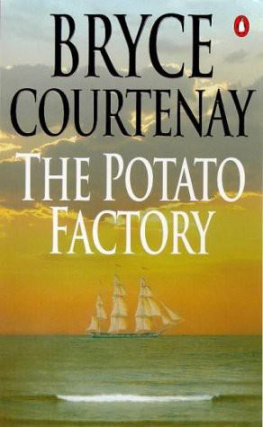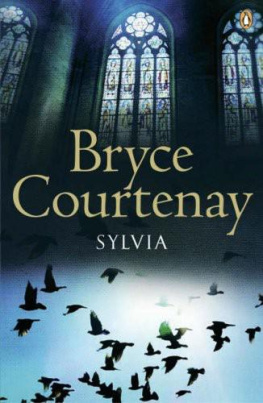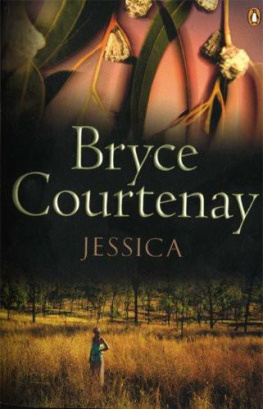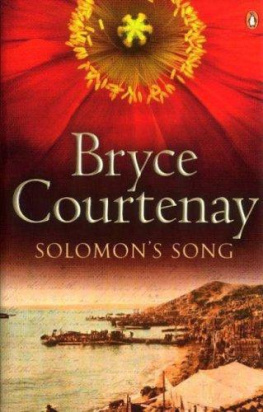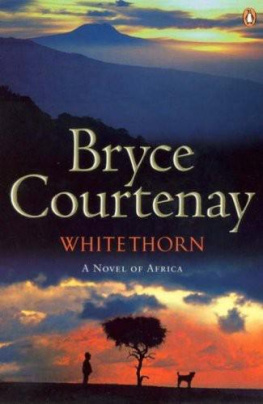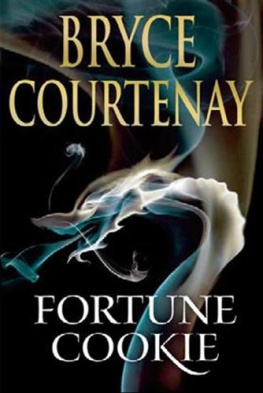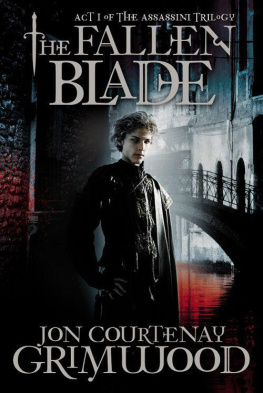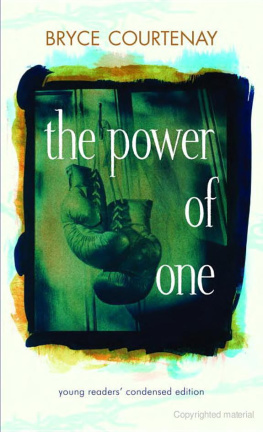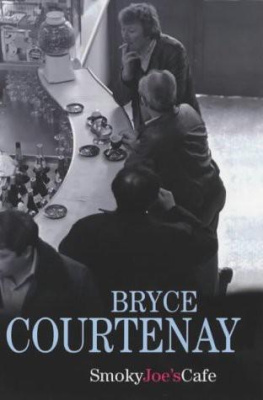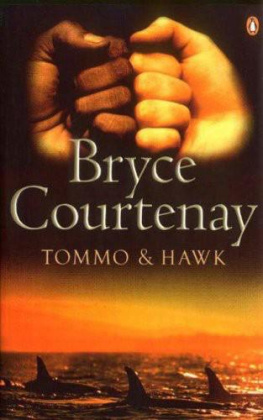Bryce Courtenay - The Potato Factory
Here you can read online Bryce Courtenay - The Potato Factory full text of the book (entire story) in english for free. Download pdf and epub, get meaning, cover and reviews about this ebook. year: 1995, genre: Non-fiction. Description of the work, (preface) as well as reviews are available. Best literature library LitArk.com created for fans of good reading and offers a wide selection of genres:
Romance novel
Science fiction
Adventure
Detective
Science
History
Home and family
Prose
Art
Politics
Computer
Non-fiction
Religion
Business
Children
Humor
Choose a favorite category and find really read worthwhile books. Enjoy immersion in the world of imagination, feel the emotions of the characters or learn something new for yourself, make an fascinating discovery.
- Book:The Potato Factory
- Author:
- Genre:
- Year:1995
- Rating:3 / 5
- Favourites:Add to favourites
- Your mark:
- 60
- 1
- 2
- 3
- 4
- 5
The Potato Factory: summary, description and annotation
We offer to read an annotation, description, summary or preface (depends on what the author of the book "The Potato Factory" wrote himself). If you haven't found the necessary information about the book — write in the comments, we will try to find it.
The Potato Factory — read online for free the complete book (whole text) full work
Below is the text of the book, divided by pages. System saving the place of the last page read, allows you to conveniently read the book "The Potato Factory" online for free, without having to search again every time where you left off. Put a bookmark, and you can go to the page where you finished reading at any time.
Font size:
Interval:
Bookmark:
BRYCE COURTENAY
THE POTATO FACTORY
Bryce Courtenay 1995
Version 1.0
For my beloved wife, Benita, who always
had absolute faith and never failed to
wrap it in abundant love.
Preface
Somepeople are bound to argue that this book is the truth thinly disguised asfiction and others will say I got it quite wrong. Both sides may well becorrect.
ThatIkey Solomon existed and was perhaps the most notorious English criminal of hisday is not in dispute, and wherever possible I have observed the chronology of hislife and that of his wife, Hannah, and their children. That Charles Dickensbased the character Fagin in his novel Oliver Twist on Ikey Solomon is aromantic notion which I much prefer to believe. But the moment I allow him andall the characters in this book to speak for themselves I have created afiction of the fact of their historical existence. By every definition this istherefore a work of fiction.
Inreading it I ask you to take into account the time in which my story occurs,the first half of the nineteenth century. In these more enlightened times thisbook may be regarded as anti-Semitic; in the terms of the times in which it iswritten, it is an accurate account of the prevailing attitudes to the Jews ofEngland.
Thesewere dark times, bleak times, hard times, times where a poor man's life wasregarded as less valuable than that of a pig, a poor Jew's far less valuableeven than that. That Ikey Solomon's life could have happened as it did in fact,allows my fiction to exploit the ability of the human spirit to transcend thevile tyranny of which humankind has proved so consistently capable. In theseterms Ikey Solomon was a real-life hero and my fiction cannot possibly do himjustice.
Inhistory there are no solitary dreams; one dreamer breathes life into the next.
SebastiaoSalgado
Be This a Warning!
This little work is held upas a warning beacon to keep the traveller from the sands of a poisonous desert,or from splitting upon the rocks of infamy.
It is necessary in such acase to point out 'hells' and brothels, girls and bawds, and rogues, by nameand situation, not as a direction for youth to steer towards them, but that hemay take the contrary course - for no reasonable man would enter a whirlpool,when he could pass by it on the smooth surface o' the reaches of a tranquilriver crossing.
The life of Ikey Solomon isfilled with iniquitous adventure; he has acted with the rope round his neck fortwenty years, but by his cunning always avoided being drawn up to the beam,where he is likely to end his infamous career.
We are duty bound to hold himup as a depraved villain, whose conduct must disgust, and whose miseries, withall his wealth, will show how preferable a life of honesty and poverty is to aguilty conscience, and treasure gained by blood and rapine.
From Ikey Solomon,Swindler, Forger, Fencer & Brothel Keeper, 1829
Book One
London
Chapter One
IkeySolomon was so entirely a Londoner that he was a human part of the greatmetropolis, a jigsawed brick that fitted into no other place. He was mixed intothat mouldy mortar, an ingredient in the slime and smutch of its rat-infesteddockside hovels and verminous netherkens. He was a part of its smoggedcountenance and the dark, cold mannerisms of the ancient city itself. He wascontained within the clinging mud and the evil-smelling putrilage. Ikey was asnatural a part of the chaffering, quarrelling humanity who lived in therookeries among the slaughterhouses, cesspools and tanneries as anyone everborn in the square mile known to be the heartbeat of London Town.
Ikeywas completely insensitive to his surroundings, his nose not affronted by themiasma which hung like a thin, dirty cloud at the level of the rooftops. Thiseffluvian smog rose from the open sewers, known as the Venice of drains, whichcarried a thick soup of human excrement into the Thames. It mixed with thefumes produced by the fat-boilers, fell-mongers, glue-renderers, tripe-scrapersand dog-skinners, to mention but a few of the stench-makers, to make London's atmospherethe foulest-smelling place for the congregation of humans on earth.
Theburial ground in Clare Market was full to the point where gravediggers would beup to their knees in rotting flesh as they crammed more bodies into graves.Corpses piled on top of each other often broke through the ground emittingnoxious gases, so that the stench of rotting bodies was always present innearby Drury Lane.
Sinceinfanthood Ikey had grown accustomed to the bloated effluence of the river andthe fetidity that pervaded St Giles, Whitechapel, Shoreditch, Spitalfields andthe surrounding rookeries. His very nature was fired, hammered and hardenedwithin this hell which was the part of London he called home.
IkeySolomon was the worst kind of villain, though in respectable company and in themagistrates' courts and the assizes he passed himself off as a small-timejeweller, a maker of wedding rings and paste and garnet brooches for what wasat that time described as the respectable poor. But the poor, in those areas ofmisery after Waterloo, had trouble enough scraping together the means to bringa plate of boiled potatoes or toasted herrings to the table. If Ikey haddepended for his livelihood on their desire for knick-knackery, his familywould have been poorly served indeed.
Inreality he was a fence, a most notorious receiver of stolen goods, one known toevery skilled thief and member of the dangerous classes in London. InLiverpool, Manchester and Birmingham young pickpockets, footpads, snakesmen andthe like referred to him in awed and reverent tones as the Prince of Fences.
IkeySolomon was not a man to love, there was too much the natural cockroach abouthim, a creature to be found only in the dark and dirty corners of life. Itmight be said that Ikey's mistress loved him, though she, herself, may havefound this conclusion difficult to formulate, love being a word not easilyassociated with Ikey. Mary wasn't Ikey's wife, nor yet his mistress, perhapssomething in between, an attachment for which there is not yet a suitable name.
Thedoubtful honour of being Ikey's wife was reserved for Hannah, a woman of a mostterrible disposition who did little to conceal her dislike for her husband.Such acrimonious sentiments as were commonly expressed by Hannah were usuallyforbidden to a woman, who was expected to accept with a high degree of stoicismher husband's peregrinations in life. A woman, after all, had no rights to carpor pout at the results of her partner's misfortunes. Nor decry his errors injudgment or his lack of moral rectitude but share the good, silently accept thebad and hope always for the best, which is the female's natural lot in life,though if this was ever made plain to Hannah, it had not sunk in too well.
Moreover,setting aside for a moment what might be considered formal filial duty, Hannahhad a good case against Ikey. Their children also were on her side, bothpuzzled and somewhat ashamed of the curious man they took to be their father.
IfIkey understood the duties of a father he chose never to exercise them. To hischildren during the hours of daylight he was a dark, huddled, sleeping bundlewrapped in a large, extremely dirty coat from which protruded at one endstrands of matted grey hair surrounding a mottled bald dome. Looking downwards,first there was a thick hedge of unkempt eyebrow and then a nose too long forthe thin face from which it grew. Still further downwards in the area of thechin grew an untidy tangle of salt and pepper beard, thick in some parts and inothers wispy, all of it most uneven and ratty in appearance.
Fromthe other end of the greasy coat stuck a pair of long, narrow, yellow boots,their sharp snouts concertinaed inwards and pointed upwards. These boots werenever seen to leave his feet and to the curious eyes of his children theirdented snouts seemed to act as sniffing devices. With the first whiff of dangerthey would jerk Ikey from the horizontal into a wide-awake seated position,their snouted ends testing the air like truffle pigs, quickly establishing thedirection from whence the danger came. Whereupon, Ikey's boots would become inappearance two yellow cockroaches, plant themselves firmly on the ground, thenscuttle him away into some dark, safe corner.
Next pageFont size:
Interval:
Bookmark:
Similar books «The Potato Factory»
Look at similar books to The Potato Factory. We have selected literature similar in name and meaning in the hope of providing readers with more options to find new, interesting, not yet read works.
Discussion, reviews of the book The Potato Factory and just readers' own opinions. Leave your comments, write what you think about the work, its meaning or the main characters. Specify what exactly you liked and what you didn't like, and why you think so.

